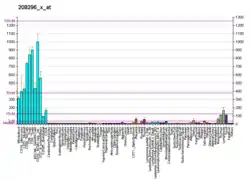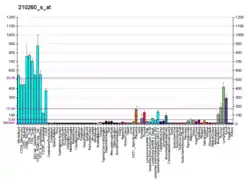TNFAIP8
Tumor necrosis factor, alpha-induced protein 8 is a protein that in humans is encoded by the TNFAIP8 gene.[5][6][7] It is preferentially expressed in human immune cell types.[8]
References
- GRCh38: Ensembl release 89: ENSG00000145779 - Ensembl, May 2017
- GRCm38: Ensembl release 89: ENSMUSG00000062210 - Ensembl, May 2017
- "Human PubMed Reference:". National Center for Biotechnology Information, U.S. National Library of Medicine.
- "Mouse PubMed Reference:". National Center for Biotechnology Information, U.S. National Library of Medicine.
- Horrevoets AJ, Fontijn RD, van Zonneveld AJ, de Vries CJ, ten Cate JW, Pannekoek H (Jun 1999). "Vascular endothelial genes that are responsive to tumor necrosis factor-alpha in vitro are expressed in atherosclerotic lesions, including inhibitor of apoptosis protein-1, stannin, and two novel genes". Blood. 93 (10): 3418–31. doi:10.1182/blood.V93.10.3418.410k23_3418_3431. PMID 10233894.
- Kumar D, Whiteside TL, Kasid U (Feb 2000). "Identification of a novel tumor necrosis factor-alpha-inducible gene, SCC-S2, containing the consensus sequence of a death effector domain of fas-associated death domain-like interleukin- 1beta-converting enzyme-inhibitory protein". J Biol Chem. 275 (4): 2973–8. doi:10.1074/jbc.275.4.2973. PMID 10644768.
- "Entrez Gene: TNFAIP8 tumor necrosis factor, alpha-induced protein 8".
- Li T, Wang W, et al. (May 2018). "Genome-wide analysis reveals TNFAIP8L2 as an immune checkpoint regulator of inflammation and metabolism". Molecular Immunology. 99: 154–162. doi:10.1016/j.molimm.2018.05.007. PMC 5995464. PMID 29787979.
Further reading
- Ewing RM, Chu P, Elisma F, et al. (2007). "Large-scale mapping of human protein-protein interactions by mass spectrometry". Mol. Syst. Biol. 3 (1): 89. doi:10.1038/msb4100134. PMC 1847948. PMID 17353931.
- Rual JF, Venkatesan K, Hao T, et al. (2005). "Towards a proteome-scale map of the human protein-protein interaction network". Nature. 437 (7062): 1173–8. doi:10.1038/nature04209. PMID 16189514. S2CID 4427026.
- Suzuki Y, Yamashita R, Shirota M, et al. (2004). "Sequence comparison of human and mouse genes reveals a homologous block structure in the promoter regions". Genome Res. 14 (9): 1711–8. doi:10.1101/gr.2435604. PMC 515316. PMID 15342556.
- Kumar D, Gokhale P, Broustas C, et al. (2004). "Expression of SCC-S2, an antiapoptotic molecule, correlates with enhanced proliferation and tumorigenicity of MDA-MB 435 cells". Oncogene. 23 (2): 612–6. doi:10.1038/sj.onc.1207123. PMID 14724590.
- Ota T, Suzuki Y, Nishikawa T, et al. (2004). "Complete sequencing and characterization of 21,243 full-length human cDNAs". Nat. Genet. 36 (1): 40–5. doi:10.1038/ng1285. PMID 14702039.
- Strausberg RL, Feingold EA, Grouse LH, et al. (2003). "Generation and initial analysis of more than 15,000 full-length human and mouse cDNA sequences". Proc. Natl. Acad. Sci. U.S.A. 99 (26): 16899–903. doi:10.1073/pnas.242603899. PMC 139241. PMID 12477932.
This article is issued from Wikipedia. The text is licensed under Creative Commons - Attribution - Sharealike. Additional terms may apply for the media files.





